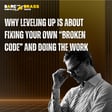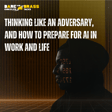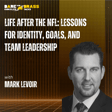
The Tech Industry and Being the Role Model You Needed as a Kid
Kendrick Trotter joins the show to talk about going from Uber driver to a major account executive at a public cybersecurity company, then founding his own business that created over $70 million in annualized salaries for underrepresented professionals.
George K and George A talk to Kendrick about:
- How a Division I football scholarship and one life-changing Uber ride with an Amazon VP changed everything
- His game-changing approach to calling CISOs
- Building Us and Technology - training 13,000+ people for free and placing them at companies like Zscaler and Airtable
- The harsh reality of what happened to DEI initiatives and why diversity of thought drives 30% more revenue
The bottom line: Kendrick's story proves that with the right mindset, genuine human connection, and "unreasonable hospitality," you can break barriers and create opportunities for others.
————
👊⚡️Support the show!
For as little as $1 a month, you can support the show and get exclusive member benefits, or send a one-time gift!
https://ko-fi.com/bareknucklesbrasstacks
Your contribution covers our hosting fees, helps us make cool events and swag, and it lets us know that what we're doing is of value to you.



















